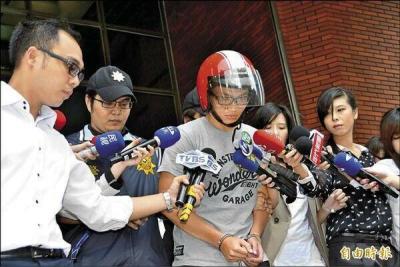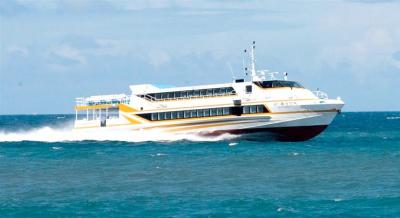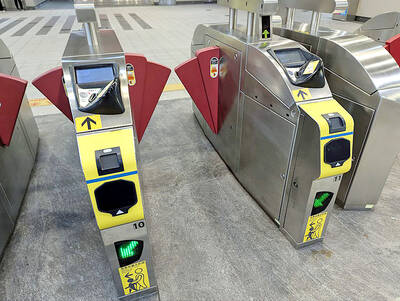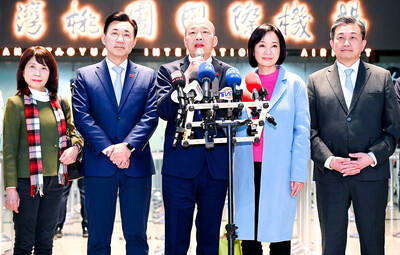US-Philippines ties are as strong as they have been in decades, with soldiers from both sides on Friday wrapping up three weeks of joint military exercises that resemble the kind of preparations necessary to help repel a Chinese invasion of Taiwan.
Yet in the northern Philippines, near a military base the US recently won access to that is crucial to any defense of Taiwan, Beijing has made inroads with key politicians.
Cagayan Governor Manuel Mamba has traveled to China twice in the past 12 months and has four copies of Chinese President Xi Jinping’s (習近平) book, The Governance of China.

Photo: AP
“We were VIPS, treated very, very well,” Mamba said of his visits to China.
“We stayed in five-star hotels. We were free to roam around all over, even at night,” he said.
Mamba said he was not “pro-China” even though he has been a vocal critic of Philippine President Ferdinand Marcos Jr’s move last year to give the US access to four more military facilities under the Enhanced Defense Cooperation Agreement (EDCA), including two in his province.
“They treat you well if you treat them well — if you go against them, like is happening now, they will not treat you well,” Mamba said about China.
“The problem now is bullying. Remove the EDCA sites, there will be no more bullying,” he said.
Strengthened US-Philippines ties have generated optimism in Washington, where policymakers hope the Southeast Asian nation would become a reliable part of its defense strategy alongside Japan, South Korea and Australia.
However, beneath the surface Washington and Beijing remain locked in a struggle for influence that is still playing out.
While the US has made gains in recent years, Beijing is not giving up.
Former Philippine president Rodrigo Duterte was deeply skeptical toward the US and shifted the Philippines closer to China, and politicians like Mamba are worried the nation would be dragged into a war.
“The US-Philippines relationship is the best it’s ever been, but there are questions over whether that can last,” said Brian Harding, a former Pentagon official who is now a Southeast Asia expert at the US Institute for Peace.
“Marcos needs to show that his pro-US push can actually pay off economically for the Philippines,” Harding said.
For now, the US has a lot going for it: Just 10 percent of Philippine citizens said they favor a partnership with China, while 79 percent said they preferred cooperation with the US, a Pulse Asia Research Inc survey in December last year showed.
Pro-US sentiment has risen in recent years, as the Philippines and China have clashed over a series of contested reefs and islands in the South China Sea, where Taiwan also has claims. Those tensions have pushed many Philippine politicians, including Marcos, closer to the US.
“President Marcos is not pro-US and he’s not anti-China — he’s pro-Filipino,” Philippine Secretary of Defense Gilberto Teodoro Jr said in an interview.
“It just so happens that the major challenge to our rights is China,” he said.
That tighter relationship has been most evident on the military side.
The joint ‘Balikatan’ drills saw more than 10,000 troops practice cyberwarfare, live artillery fire and repel an amphibious assault on a beach.
It culminated with the two nations bombarding a decommissioned, Chinese-made oil tanker, sending it to the bottom of the sea.
The decades-old Balikatan, Tagalog for “shoulder-to-shoulder,” exercises have increasingly come to resemble real combat.
They are just one part of what US officials describe as a historic shift in an alliance that helps safeguard a crucial shipping lane in the South China Sea and whose strategic location could prove decisive in a future war over Taiwan.
US officials acknowledge that shoring up the US-Philippine alliance in the long run would require Washington to deliver economic benefits, not just military exercises.
During a recent visit, US Secretary of Commerce Gina Raimondo said that US companies are to make investments amounting to more than US$1 billion in the Philippines.
Meanwhile, in the northern Philippines, residents are skeptical of pushing China away.
“The Philippines makes a lot of money from the Chinese people,” said Evangeline Raguindin, a teacher at the Taribubu Elementary School, where a Chinese foundation is paying for new school buildings.
Asked about Manila’s recent territorial clashes with Beijing in the South China Sea, she said: “We’re not affected here.”
Mamba has results to show for his relationships in Beijing.
This year, a new US$73 million irrigation project began pumping water near his hometown of Tuao. Mamba had pursued the project for years.
When funding finally arrived, it came in the form of a loan from the Export-Import Bank of China.
The US is “triggering tensions in the region and jeopardizing regional peace and stability. The Philippine side should recognize the situation clearly and should not sacrifice its own security interests for the sake of others, thereby jeopardizing its own interests,” Chinese Ministry of Foreign Affairs officials said when asked about Mamba’s trip and whether China views the US as an enemy.
Analysts say Beijing’s courting of leaders like Mamba is not a surprise.
“China is good at courting sub-national elites, promising them things, from education opportunities to infrastructure,” said Julio Amador, CEO of Amador Research Services, a political consultancy in Manila.
“These are not necessarily bad in themselves, but it shows that China understands that all politics are local,” Amador said.

Death row inmate Huang Lin-kai (黃麟凱), who was convicted for the double murder of his former girlfriend and her mother, is to be executed at the Taipei Detention Center tonight, the Ministry of Justice announced. Huang, who was a military conscript at the time, was convicted for the rape and murder of his ex-girlfriend, surnamed Wang (王), and the murder of her mother, after breaking into their home on Oct. 1, 2013. Prosecutors cited anger over the breakup and a dispute about money as the motives behind the double homicide. This is the first time that Minister of Justice Cheng Ming-chien (鄭銘謙) has

Ferry operators are planning to provide a total of 1,429 journeys between Taiwan proper and its offshore islands to meet increased travel demand during the upcoming Lunar New Year holiday, the Maritime and Port Bureau said yesterday. The available number of ferry journeys on eight routes from Saturday next week to Feb. 2 is expected to meet a maximum transport capacity of 289,414 passengers, the bureau said in a news release. Meanwhile, a total of 396 journeys on the "small three links," which are direct ferries connecting Taiwan's Kinmen and Lienchiang counties with China's Fujian Province, are also being planned to accommodate

TRANSPORT CONVENIENCE: The new ticket gates would accept a variety of mobile payment methods, and buses would be installed with QR code readers for ease of use New ticketing gates for the Taipei metro system are expected to begin service in October, allowing users to swipe with cellphones and select credit cards partnered with Taipei Rapid Transit Corp (TRTC), the company said on Tuesday. TRTC said its gates in use are experiencing difficulty due to their age, as they were first installed in 2007. Maintenance is increasingly expensive and challenging as the manufacturing of components is halted or becoming harder to find, the company said. Currently, the gates only accept EasyCard, iPass and electronic icash tickets, or one-time-use tickets purchased at kiosks, the company said. Since 2023, the company said it

BITTERLY COLD: The inauguration ceremony for US president-elect Donald Trump has been moved indoors due to cold weather, with the new venue lacking capacity A delegation of cross-party lawmakers from Taiwan, led by Legislative Speaker Han Kuo-yu (韓國瑜), for the inauguration of US president-elect Donald Trump, would not be able to attend the ceremony, as it is being moved indoors due to forecasts of intense cold weather in Washington tomorrow. The inauguration ceremony for Trump and US vice president-elect JD Vance is to be held inside the Capitol Rotunda, which has a capacity of about 2,000 people. A person familiar with the issue yesterday said although the outdoor inauguration ceremony has been relocated, Taiwan’s legislative delegation has decided to head off to Washington as scheduled. The delegation